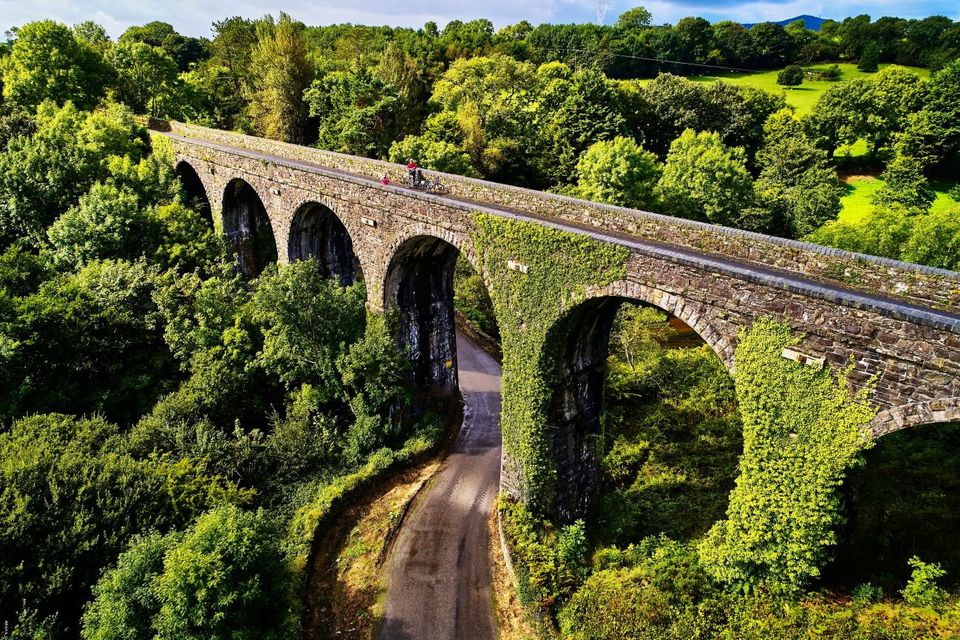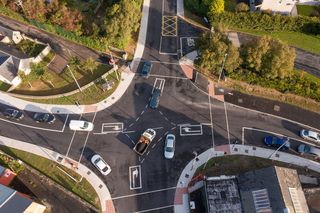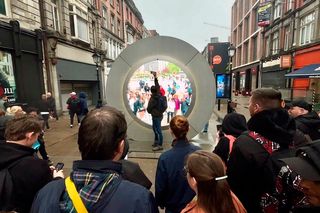Letters: Sarah Carey nails it on greenways and the benefits they bring locally
Durrow Viaduct in Waterford's greenway
Sarah Carey’s article (‘It’s wrong to oppose greenways in hope of railways that might never happen’, Irish Independent, April 27) was, as always, concise and to the point.
In a couple of crisp sentences, she cut through the fog surrounding the entire greenway debate and the madly illogical opposition to the provision of such infrastructure.
Greenways revitalise neglected rural communities. That is inarguable, you just have to look at the reality of the local economic boost provided by these trails in places like Waterford, where the use of a closed railway line for leisure brought a quarter of a million unique visitors to the region in the first year of operation alone.
Apart from economic benefits, the impact of greenways on the health and well-being of local residents is immeasurable.
There is another upside to greenways on closed rail alignments, they keep these routes in public ownership in case they are ever needed for rail use in the future. For that alone surely they are worth building, or at least worth considering?
Carey highlights a staggering story in Mayo, where county councillors decided, against the advice of their CEO and against the wishes of 27,000 local petitioners, to insert a clause in the county development plan that blocks any feasibility study of a greenway on a closed railway between Claremorris and Charlestown.
They blocked any possibility of even examining whether such a project would be worth examining. It appears evidence-based policy-making has no place in the Mayo council chamber; it seems to prefer to rely on guesswork.
This is a story of councillors blocking investment in their own county, in direct opposition to the wishes of the people they are supposed to represent. You really couldn’t make this stuff up.
John Mulligan, Boyle, Co Roscommon
Now Michael McDowell is back, his role in economic collapse is worth probing
Joseph Kiely’s letter on Saturday (‘Grim talk around jails should be replaced with a will to tackle main cause of crime – inequality’, Letters, April 27), which mentioned the extravagant purchase of Thornton Hall for a new prison way back in 2005 by then justice minister Michael McDowell, brings back memories.
McDowell paid over €30m for the 150 acres of farmland in north county Dublin, almost 10 times the going rate for land adjacent to it.
Then Labour leader Pat Rabbitte said in the Dáil: “It was the most profligate waste of taxpayers’ money by a blundering minister that rivals anything that Deputy Enda Kenny has instanced about the other decisions on which you wasted so much money during the lifetime of this government”.
It should also not be forgotten that McDowell came from a Fine Gael background when joining the Progressive Democrats. The PDs was not his preferred name though. He instead favoured calling the new party The National Party or the The Radical Party, among other names.
As McDowell is enjoying a sort of second wind in politics, perhaps journalists might look a little bit closer at his past and how he and the party he once led contributed to the financial and economic crash in 2008.
Otherwise we may be destined to repeat history, with the rise of right-wing ideologues who favour the haves and the well-heeled, if we choose to ignore our not-so-distant past.
Tom McElligott, Listowel, Co Kerry
European Jews in Israel were not ‘opportunistic’, they were returning home
Daniel Teegan (‘Palestine belongs to the Palestinians, despite best efforts of Old Testament’, Letters, April 27) describes Jews who colonised parts of Palestine as “opportunist emigres” and “converts to Judaism who bear no resemblance to ancient Arab Jews and do not share a common DNA with them”.
A remarkable filtering of history is taking place here. Apart from the Jews who already lived in Palestine, the Jewish people who emerged from the liberated concentration camps were European, that is true.
However, they existed in Europe not as converts, but as descendants of Jews expelled systematically and repeatedly from Palestine by the Romans, by Christians and by Muslims.
How the six-million Jews murdered by Europeans would have loved to be mere “opportunists”, like the rest of us. The stories of Jewish survivors returning home to their European birthplaces on release from the camps and being murdered or finding their neighbours living in their houses are legion.
Irish people might consider the following scenario. If, in 1916, Irish emigrants in America, where they had arrived due to starvation and persecution by the British, were being murdered in captivity by the thousands and at the end of the purge no country would come to the aid of those survivors being released from the camps, would those Irish people have a right to return to the land of their roots and fight for an independent state, for the first time?
Eugene Tannam, Firhouse, Dublin 24
Trump v Biden debate: who wants to see two old has-beens rambling on?
There are some, mostly sane, people who feel a TV debate between Biden and Trump is likely to be a very damp squib and should be abandoned.
Who really has the need, much less the desire, to watch two old has-beens rambling on; one with no idea about history, integrity, geo-politics or anything else, the other doing his best to stay awake. What a choice.
David Ryan, Co Meath
If politicians spent less time talking we might just solve the housing crisis
The new homeless figures are truly shocking. We have one of the wealthiest economies in the world. We have an abundance of land, our population density is one of the lowest in the world.
Maybe if ministers stopped talking and started showing real leadership we might try building more homes.
Paul Doran, Dublin 22
My mistake in Spain was too late to fix by the time my friend had clocked it
While wandering through a village in Spain recently I was approached by a man pointing excitedly at his wrist. Assuming he was selling watches, I gestured in no uncertain terms that I was not remotely interested.
My companion, who understands Spanish, told me the man had politely asked me what time it was. No doubt he went away convinced that we Irish “wouldn’t give you the time of day”.
Tom Gilsenan, Beaumont, Dublin 9
Join the Irish Independent WhatsApp channel
Stay up to date with all the latest news















